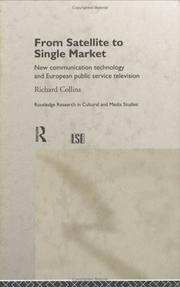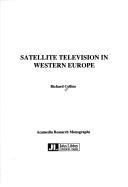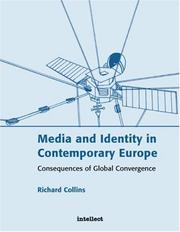| Listing 1 - 10 of 30 | << page >> |
Sort by
|

ISBN: 041517970X 1134681283 128015781X 0203984242 9780203984246 6610157812 9786610157815 9781134681280 9781134681235 9781134681273 9780415179706 1134681275 Year: 1998 Publisher: London Routledge
Abstract | Keywords | Export | Availability | Bookmark
 Loading...
Loading...Choose an application
- Reference Manager
- EndNote
- RefWorks (Direct export to RefWorks)
Richard Collins explores public service television's role in fostering pan-European cultural identity. Based on extensive primary research, interviews with participants and analysis of key European programmes, this book documents the growth of the public service satellite television network which was backed by the European Union, and its eventual alliance with Rupert Murdoch's commercial Sky network.
Telecommunication technology --- European Union --- Public television-- European Union countries-- History. --- Public television --- Direct broadcast satellite television --- Journalism & Communications --- Radio & TV Broadcasting --- History --- History. --- Direct-to-home satellite television --- Home satellite television --- Satellite television, Direct broadcast --- Satellite television, Home --- Non-commercial television --- Noncommercial television --- Earth stations (Satellite telecommunication) --- Home video systems --- Television broadcasting --- Public broadcasting --- Public service television programs
Book
ISBN: 0861964055 9780861964055 Year: 1994 Publisher: London Libbey
Abstract | Keywords | Export | Availability | Bookmark
 Loading...
Loading...Choose an application
- Reference Manager
- EndNote
- RefWorks (Direct export to RefWorks)
audiovisuele communicatie --- omroep --- Mass communications --- European Union --- Broadcasting --- Television broadcasting --- Television broadcasting policy --- Audio-visual materials --- Government policy --- European Economic Community countries --- Economic policy --- 316.774.12:654.19 --- 654.1 --- #SBIB:309H1511 --- #A9501A --- Omroepwezen: communicatiepolitieke aspecten. Wereldinformatieorde--(communicatiesociologie) --- Telegraphy. Telephony. Radio. Television --- Radio- en/of televisie: communicatiepolitieke aspecten (nationaal, internationaal) --- 654.1 Telegraphy. Telephony. Radio. Television --- 316.774.12:654.19 Omroepwezen: communicatiepolitieke aspecten. Wereldinformatieorde--(communicatiesociologie) --- Broadcasting - Europe --- Television broadcasting - Europe --- Television broadcasting policy - Europe --- Audio-visual materials - Government policy - Europe --- European Economic Community countries - Economic policy

ISBN: 0044457650 0044457669 Year: 1990 Publisher: London, Cambridge, MA : Unwin Hyman,
Abstract | Keywords | Export | Availability | Bookmark
 Loading...
Loading...Choose an application
- Reference Manager
- EndNote
- RefWorks (Direct export to RefWorks)
Television broadcasting policy --- Télévision --- Politique gouvernementale --- #SBIB:309H1511 --- Television broadcasting --- Television broadcasting and state --- Broadcasting policy --- Radio- en/of televisie: communicatiepolitieke aspecten (nationaal, internationaal) --- Government policy --- Television broadcasting policy. --- Télévision

ISBN: 0861962036 9780861962037 Year: 1990 Volume: 1 Publisher: London Libbey
Abstract | Keywords | Export | Availability | Bookmark
 Loading...
Loading...Choose an application
- Reference Manager
- EndNote
- RefWorks (Direct export to RefWorks)
Direct broadcast satellite television --- #SBIB:309H1713 --- #SBIB:309H1515 --- -Direct-to-home satellite television --- Home satellite television --- Satellite television, Direct broadcast --- Satellite television, Home --- Earth stations (Satellite telecommunication) --- Home video systems --- Television broadcasting --- Mediatechnologie: nieuwe toepassingen (abonnee-televisie, electronic mail, desk top publishing, virtuele realiteit...) --- Radio- en/of televisie: technologie (met inbegrip van de sociale implicaties) --- -Mediatechnologie: nieuwe toepassingen (abonnee-televisie, electronic mail, desk top publishing, virtuele realiteit...) --- Direct-to-home satellite television --- Direct broadcast satellite television - Europe.

ISBN: 0802046991 0802067727 0802027334 1442673672 9781442673670 9780802067722 9780802027337 1442654929 Year: 1990 Publisher: Toronto
Abstract | Keywords | Export | Availability | Bookmark
 Loading...
Loading...Choose an application
- Reference Manager
- EndNote
- RefWorks (Direct export to RefWorks)
?There can be no political sovereignty without culture sovereignty.? So argued the CBC in 1985 in its evidence to the Caplan/Sauvageau Task Force on Broadcasting Policy. Richard Collins challenges this assumption. He argues in this study of nationalism and Canadian television policy that Canada?s political sovereignty depends much less on Canadian content in television than has generally been accepted. His analysis focuses on television drama, at the centre of television policy in the 1980s.Collins questions the conventional image of Canada as a weak national entity undermined by its population?s predilection for foreign television. Rather, he argues, Canada is held together, not by a shared repertoire of symbols, a national culture, but by other social forces, notably political institutions. Collins maintains that important advantages actually and potentially flow from Canada?s wear national symbolic culture. Rethinking the relationships between television and society in Canada may yield a more successful broadcasting policy, more popular television programming, and a better understanding of the links between culture and the body politic. As the European Community moves closer to political unity, the Canadian case may become more relevant to Europe, which, Collins suggests, already fears the ?Canadianization? of its television. He maintains that a European multilingual society, without a shared culture or common European audio-visual sphere and with viewers watching foreign television, can survive successfully as a political entity ? just as Canada has.
Mechanics, Analytic --- 316.774.16:654.197 --- #SBIB:309H1522 --- Televisiewezen: maatschappelijk, politiek, ideologisch, ethisch, juridisch, socio-cultureel--(communicatiesociologie) --- Radio- en/of televisieprogramma’s met een ideologische en spiegelfunctie --- 316.774.16:654.197 Televisiewezen: maatschappelijk, politiek, ideologisch, ethisch, juridisch, socio-cultureel--(communicatiesociologie) --- #SBIB:309H1514 --- Radio- en/of televisie: politieke, juridische, ethische, ideologische aspecten (bv.censuur) --- Television broadcasting --- Television and politics --- Nationalism --- Social aspects --- Politics and television --- Political science --- Telecasting --- Television --- Television industry --- Broadcasting --- Mass media --- Political aspects --- CINEMA --- CULTURE NATIONALE DANS LES FILMS --- SOCIETE ET LE CINEMA --- TELEVISION ET LE CINEMA --- CANADA

ISBN: 1841500445 9786610476558 1280476559 1841508667 9781841508665 9781841500447 9781280476556 Year: 2002 Publisher: Bristol Intellect
Abstract | Keywords | Export | Availability | Bookmark
 Loading...
Loading...Choose an application
- Reference Manager
- EndNote
- RefWorks (Direct export to RefWorks)
An integrated analysis of the central issues in contemporary media policy. Chapters focus on technological change and its impact on cultural and political identities, the role of the cultural industries in the 'New Economy' and the impact of European integration on national institutions - public service broadcasting in particular. Because technological change in broadcasting has enabled us to open up media markets, the shape of media and of society has become more internationally-oriented. Indeed, modern international media has bought into question the very legitimacy of national communities a...
Communication --- Mass media policy --- Mass media --- Public television --- #SBIB:309H1515 --- #SBIB:309H402 --- Radio- en/of televisie: technologie (met inbegrip van de sociale implicaties) --- Media en publiekgroepen: gebruik van de boodschap, effecten van de media, ... --- Non-commercial television --- Noncommercial television --- Public broadcasting --- Television broadcasting --- Public service television programs --- Mass media and state --- State and mass media --- Communication policy --- Communication, Primitive --- Mass communication --- Sociology --- Media en publiekgroepen: gebruik van de boodschap, effecten van de media, .. --- Government policy --- Media en publiekgroepen: gebruik van de boodschap, effecten van de media, . --- Communication and mass media --- Media en publiekgroepen: gebruik van de boodschap, effecten van de media,

ISBN: 0803997485 0803997493 9780803997493 Year: 1986 Publisher: London
Abstract | Keywords | Export | Availability | Bookmark
 Loading...
Loading...Choose an application
- Reference Manager
- EndNote
- RefWorks (Direct export to RefWorks)
Mass media --- Médias --- Social aspects --- Aspect social --- #SBIB:309H1020 --- Mediaboodschappen: algemene werken (met inbegrip van genres, taalgebruik en historiek) --- #SBIB:316.7C140 --- 316.773.3 --- 316.77 --- 316.77 Communicatiesociologie --- Communicatiesociologie --- 316.773.3 Communicatieinhoud. Communicatieve functies van de boodschap--(communicatiesociologie) --- Communicatieinhoud. Communicatieve functies van de boodschap--(communicatiesociologie) --- Mass communication --- Media, Mass --- Media, The --- Communication --- Cultuursociologie: cultuur en globale samenlevingen --- Mass communications --- Sociology of culture --- Social aspects. --- Mass media - Social aspects --- Mass media - Social aspects - Great Britain --- Mass media - Social aspects. --- Mass media - Social aspects - Great Britain.
Book
ISBN: 1942493088 9781942493082 9781935387954 1935387952 Year: 2015 Publisher: Chino Valley, Arizona
Abstract | Keywords | Export | Availability | Bookmark
 Loading...
Loading...Choose an application
- Reference Manager
- EndNote
- RefWorks (Direct export to RefWorks)
Zen Buddhism --- Religion --- Philosophy & Religion --- Buddhism --- Chʻan Buddhism --- Dhyāna (Sect) --- Zen --- Zen (Sect) --- Mahayana Buddhism --- Doctrines
Book
ISBN: 1849465223 9781849465229 Year: 2016 Publisher: Oxford: Hart,
Abstract | Keywords | Export | Availability | Bookmark
 Loading...
Loading...Choose an application
- Reference Manager
- EndNote
- RefWorks (Direct export to RefWorks)
Since the end of the nineteenth century, international law has been widely understood as an autonomous legal order, similar in nature if, importantly, not in structure to law within the state.Whilst this understanding has bolstered the professional identity of international legal practice, it has come at the price of a perpetual sense of structural deficiency over the decentralised institutional nature of the international legal order.To maintain the claim to legal autonomy, it has been common to read into the international legal order forms of normative hierarchy accompanied by functional constitutional substitutes (of a legislative, executive, or adjudicative nature).In this book, the author engages critically with the self-defeating nature of these constitutional substitutes, explaining the irresolvable nature of this "institutional problem" as well as the shortcomings of the kind of Rule of Law idealism from which the problem arises in the first place.Instead, the book sets out a plea for international lawyers to understand the purpose and potential of international law on its own terms, whilst at the same time challenging the coherence of the domestic legal paradigm against which its institutional structures are commonly found wanting.
Book
Year: 2002 Publisher: Bristol Intellect
Abstract | Keywords | Export | Availability | Bookmark
 Loading...
Loading...Choose an application
- Reference Manager
- EndNote
- RefWorks (Direct export to RefWorks)
Mass communications --- media-industrie --- TV (televisie) --- omroep --- European Union
| Listing 1 - 10 of 30 | << page >> |
Sort by
|

 Search
Search Feedback
Feedback About UniCat
About UniCat  Help
Help News
News